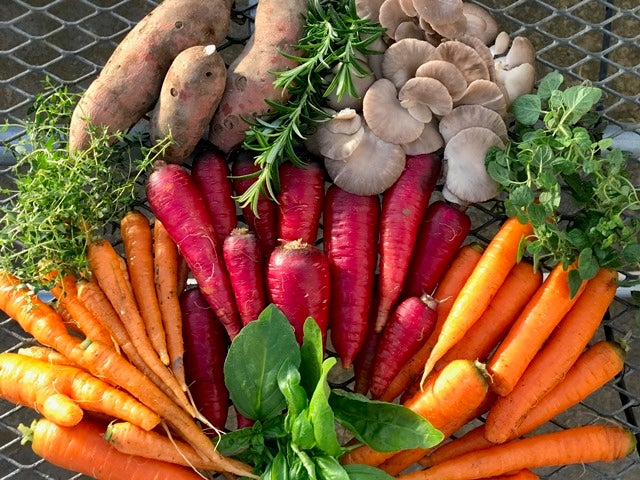Food For Our Campus Dining
In October 2009, the Case Western Reserve University Farm administration, Bon Appétit, and SAGES faculty met to discuss a new initiative called The Farm Food Program. The purpose is to grow food at the University Farm to supply locally grown and fresh vegetables to the campus dining rooms.
The goals of this initiative are to provide new educational opportunities to faculty and students to study local food production in a sustainable way using mostly organic methods and deliver fresh food and herbs to the campus.
Program Highlights
Although the Farm Food Program is not USDA Certified Organic, it uses techniques that are consistent with the principles of organic gardening. We use no herbicides, instead favoring the time-honored and labor-intensive tradition of manual weeding. When needed, more productive, gas-powered handheld tillers are used sparingly. Organic fertilizers are used as alternatives to traditional quick-release chemical fertilizers, and instead of chemical insecticides, bio-controls such as predatory insects and plant-derived solutions are employed for pest control as well as pest population monitoring systems.
The program is still growing, but we endeavor to work with nature to produce healthy, fresh produce for our dining facilities. In our outdoor planting areas, we deal with the ever-present predator pressure from deer, rabbits and other would-be crop thieves with the use of deer fencing. In 2014, we added an electric fence to our lower garden to prevent raccoons and other intruders.
Water Conservation
For our indoor growing areas, we are constantly making improvements to our irrigation systems. Our growing tables are currently being outfitted with a variety of water-delivery systems that operate on timers. These help control and limit the waste associated with overhead hand-watering. We have also expanded the use of our existing rainwater-harvesting system with the goal of collecting and using all of the rainwater from our greenhouse gutter system.
Soil Conservation
In 2011, a compost program was established at the Farm. Compost is organic material that can be used as a soil amendment. It is a cheap source of quality soil amendments and uses and recycles waste generated by the campus dining-halls.
EPA requirements for compost piles are: at least 200 feet from a body of water, to be set up on an absorbent material (dry leaves, mulch, etc.) and it needs to be bounded by an embankment to stop surface runoff.
In addition to continuing to increase the size and scope of food production to supply an even greater percentage of the food consumed on campus, we hope to branch out into other areas. As of 2018, we currently serve CWRU's campus dining service, the Bon Appétit Management Company, ten Cleveland- area restaurants, and occasional local visitors of our farm. In 2014, we began producing oyster mushrooms in what was previously used as a root cellar. This project has been a huge success, producing at least 25 lbs of mushrooms per week, on average. In 2015, we looked into ways to improve this production, as well as to add more permanent fruit plants to our growing space, including currants, blueberry bushes and strawberry plants. We look forward to expanding our operations, with a strong focus on maintaining the projects we currently have in place. In doing so, our hope is to increase production and reduce energy expenditure.
See What Students Have to Say...
"The program has done fantastically in its first year, and I look forward to being part of it for my senior Capstone project. I think it's important for students to learn more about how food production occurs and how sustainable production will be a big issue in coming years. And I think the Farm Food Program can provide that education and opportunities for research.
"Personally, I enjoy feeling productive, because the work done at the farm provides tangible (and edible!) results. Working outside, producing nutritious food and still performing scientific research is a wonderful mix that the program offers me. I also enjoy being a part of a growing program, knowing that the work I do now can have a lasting impact because the program has so much room to grow and has plenty of room for new ideas and initiatives. I think everybody should spend at least one day out at the farm working with the Farm Food Program because it's an experience you can't get anywhere else at CWRU."
—Eric Hamilton, CWRU student and Student Sustainability Council member


